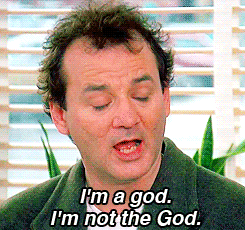Chapter 5 of potential hindrances to our creative development:
**00V: We need to be ‘inspired‘ in order to create.**
Coming to the end of this chapter, I cannot help noticing the cause-and-effect flavour of this statement and how this linear view toward something as timeless and ubiquitous as inspiration may be the root of several kinks in our creative connection.
Here are just some of the kinks that I attempted to unwind:
- We need to be inspired first
- We have a preconceived idea of what inspiration should look like
- Creating without inspiration is a waste of time
- We wait for something outside of us to put us in the mood
- We have no idea what inspires us to express ourselves
- We have no clue what part we consciously play to connect with inspiration
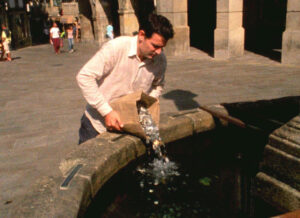
Source unknown.
Perhaps one of the central crimps is that many of us are suffering from a sense of emptiness and boredom and it’s like perpetually waiting for something that never comes. Our phones, sports, other entertainment and political enthusiasms may distract us for a while but time and again we end up back in the wasteland of our homes all worn-out and disenchanted. It’s like the more we try to fill the black hole inside of us with external goodies, the greater the feeling of emptiness. Maybe this is because entertainment does not ask anything of us—we are not expressing or creating anything from inside and the void within can only be filled from within. We tend to get hung up on defending our freedom but only when we create something meaningful through freedom is freedom important. Perhaps this is why finding an inner meaning to life is more important for the individual than any other concern. And I really must emphasize individual (the mass ‘shoulds’ for what it means to live a good life are off the hook). [Sidebar: I hope I’m not making entertainment sound like the devil. I quite enjoy entertainment times. I am only bringing up the downside of an imbalance]
In part 1, I mentioned one way to utilize our freedom to create meaning which is to find what we love through living; to reconnect with our inner and outer world through the direct gaze of a child. That’s the gift by finding; uncovering what we love and committing to it regardless of all the ways we have been conditioned against it. We may all be born creative but apparently we have to wake up to our individual expression. Whatever excites or sparks curious impulses in us is part of the wake-up call.
I also talked about circling in on what we love by becoming aware of the direction of our attention. I can usually tell when mine is fixated in a useless direction when I feel unnecessarily serious, anxious or troubled. Paying attention to our higher vibe inner guidance/impulses transforms an impersonal, meaningless and arbitrary world into a realm full of individual, significant, and mysteriously ordered events. It’s like living in our own mini cosmos because the little things in the world around us begin to acquire importance for us in a context of inner meaning. For example, on several occasions when I have been stuck on a thought or idea, a song will come on the radio and there is a line that provides the perfect insight to my problem. Obviously, this is only meaningful to me and my personal inquiries.
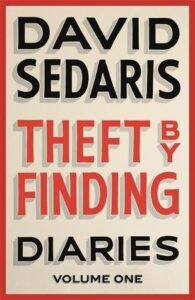 In part 2 I proposed the practice of creating a sacred space to help us get into a receptive mode so that we are available to inspiration. In this sacred space we may choose tools to get into a relaxed and open state to connect with our intuition. Writer David Sedaris uses a diary as a primary tool for inspiration and once shared, “If nothing else, a diary teaches you what you’re interested in.” (A helpful hint that one impulsive activity might help us narrow in on our deeper interests)
In part 2 I proposed the practice of creating a sacred space to help us get into a receptive mode so that we are available to inspiration. In this sacred space we may choose tools to get into a relaxed and open state to connect with our intuition. Writer David Sedaris uses a diary as a primary tool for inspiration and once shared, “If nothing else, a diary teaches you what you’re interested in.” (A helpful hint that one impulsive activity might help us narrow in on our deeper interests)
Part 3 was a glance at the experience of being creatively blocked and how reconnecting with the unknown might help us unify our feeling and intellect. I also mentioned the need to meet inspiration halfway by continuing to give attention to our work/play and thereby keep our “receiving equipment in order.” In this way we are co-creaters. Tom Waits describes mutual participation with inspiration as:
“I think everybody’s looking for something they’ve never seen before. You work on your songs, but your songs also work on you. So you absorb and you excrete and in some way you retain, and slowly you start to become some place that songs are passing through. I’d like to think that they enjoy blowing through you. There’s something electric about you, maybe, some kind of a force left behind by music that passes through you. Like everybody likes to be around someone who does something well and loves doing it, so songs would be no different, right? Like, ‘Let’s blow down and see that guy.”
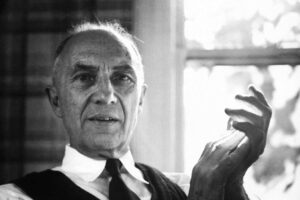
Photo by Lisa Larsen/The LIFE Picture Collection via Getty Images
Perhaps I neglected to point out that our creative life does not need to be something divided from what we might think of as our daily grind. Poet William Carlos Williams managed to work as a doctor from 7am-9pm (pediatrics and general medicine) and published an astonishing amount of poetry and prose. People would often ask him how on earth he found time to write and assumed he was blessed with superhuman energy. To this he responds:
“But they do not grasp that one occupation complements the other, that they are two parts of a whole, that it is not two jobs at all, that one rests the man when the other fatigues him.”
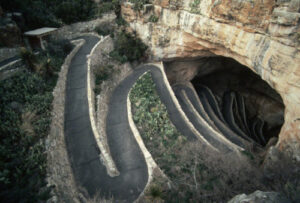
ca. 1980s, Carlsbad Caverns National Park, New Mexico, USA. Image by © Tom Bean/CORBIS
Recently I came across the word Schaffen, which is German for ‘create’— but it refers to taking water up with a bucket out of a well. There is a deep wisdom in this image as the answers we seek lie in our internal depths waiting to be brought out in our external reality. Inspiration may come from the expansive universe (the breath in) but our inner treading directs how we weave it into our way of life (the breath out). It may seem like an impossible task to access this mysterious intelligence when it is all up to us to suss out this bucket and our well. But, hey, if it means finding delight and wonder in the vastness of life, that’s not so bad. There’s a door up ahead not a wall.
“What makes the desert beautiful,” said the little prince,
“is that somewhere it hides a well…”
ANTOINE DE SAINT-EXUPÉRY, ‘The Little Prince’
*Disclaimer: No copyright infringement intended. I do my best to track down original sources. All rights and credits reserved to respective owner(s). Email me for credits/removal.
